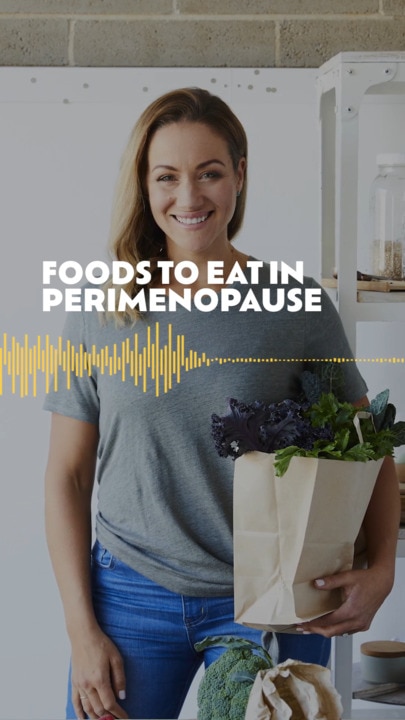The devastating relationship symptom you might not recognise as perimenopause
One Aussie mum says it nearly destroyed her marriage.

Sex Relationships
Don't miss out on the headlines from Sex Relationships. Followed categories will be added to My News.
It can be hard to tell where your hormonal irritation ends and your partner’s shortcomings begin.
Ask any woman in the grips of PMS, and what feels like searing clarity over the fact that her husband’s audible chewing is the single most irritating sound on the planet, can in fact seem far less egregious once her luteal phase is over and the red mist has literally and figuratively cleared.
Want to join the family? Sign up to our Kidspot newsletter for more stories like this.
Is this really him or me?
For one Sydney mum, however, hormonal changes were to blame for far bigger issues in her marriage - issues that nearly split up a 20-year relationship.
“It would have been about six months or even longer of near-constant criticism from me towards my husband, Lee*,” says Anneliese*, 43.
“I’d had so many conversations with my friends about how often he was dropping the ball around the house, how useless he was at remembering stuff, and how I was genuinely wondering if I’d be better off alone,” she says.
“Of course, they were totally supportive and commiserating with me, but I can see now how much I was blowing every little thing out of proportion.”
RELATED: What you need to know about perimenopause

The moment I lost it
It all came to a head one morning last year, when Anneliese and Lee were about to host some extended family for a pre-Christmas get-together.
“I was just thundering around the house, yelling at the kids,” recalls the mum-of-three.
“I’d gone out to pick up last minute supplies, left Lee with a list of things to do, and when I got back and he’d left one thing off the list - to wipe down the chairs on the back deck - I just lost it.”
After blowing up at her husband for not completing his list of things fast enough, Anneliese set about preparing lunch, before heading out to the back deck to find Lee in tears.
“He just had his head hung, and he looked so defeated it stole my breath,” she says.
“He just asked me ‘do I even make you happy anymore? Because it feels like you hate me a lot of the time and I miss the version of you that used to like me.’”
Anneliese realised she’d not only been irrationally angry - but had been focusing a lot of that anger on Lee.
“It was like a lightbulb moment, realising that I’d been funnelling all this irritation towards the one safe person in my life,” she says, “and I’m not sure I’ll ever get over the guilt of making him feel like that.”
Introducing our new podcast: Mum Club! Listen and subscribe wherever you get your podcasts so you never miss an episode.
At an appointment a few weeks later, Anneliese told her GP she’d been feeling like she was stuck in “constant PMS” emotionally. She thought she was going to leave with a prescription for anti-anxiety meds. What she got was an explainer on perimenopause.
“The doctor told me that my symptoms were in line with perimenopause, and that just because I wasn’t having hot flushes or skipping periods, it didn’t mean I couldn’t be experiencing the emotional side effects.”
Dr Louise Newson - GP and global menopause expert - has firsthand experience of how big an impact perimenopause can have on relationships.
“Perimenopause is the period of our lives where our hormones begin to decline, but you’re yet to go a full 12 months without a period,” she tells Kidspot.
“The impact that this decline can have on our mental health and mood is significant, if often under-discussed – inevitably, it can also have a significant effect on our relationships. Symptoms of low mood, anxiety, irritability and brain fog can be common, as well as reduced libido. For partners, this can often be confusing, complex and difficult to deal with – my own symptoms nearly led my husband and I to the brink of separating.”
RELATED: Do I need HRT to manage my perimenopause?
Common behaviour in women with perimenopause
Dr Newson says it’s essential that both parties educate themselves on the symptoms of perimenopause, as it can not only help contextualise this change in behaviour, but allow partners to provide support and encouragement on treatment options.
“Often women might not know that they could be perimenopausal when these symptoms first emerge,” she explains, “so partners being open and responsive to their needs is essential, whether that’s at first simply accepting that there’ll be bad days, or by doing their own research on treatment options and providers to try and offer that gentle push to find help.”
“Menopause and perimenopause can be a change of life for all, and one that doesn’t happen overnight,” she continues, “it’s important to take the good with the bad. Our free balance app offers a number of resources that can help, including a symptoms tracker, which could be something couples could look at together.”
For Anneliese, a year on from that moment where it all clicked, she says her and Lee are in a far better place.
“Lee and I have both worked really hard at understanding what is my hormones, and what is a genuine issue to be solved in our relationship,” she says.
“I started on hormone replacement therapy (HRT) about eight months ago and it has been a game-changer in so many ways. I still have a lot of guilt for the way I’d made him feel, and how hard I must have been to live with, but I am also very grateful that I was able to learn so much more about myself and my body through the process.”
*Names have been changed
More Coverage
Originally published as The devastating relationship symptom you might not recognise as perimenopause




